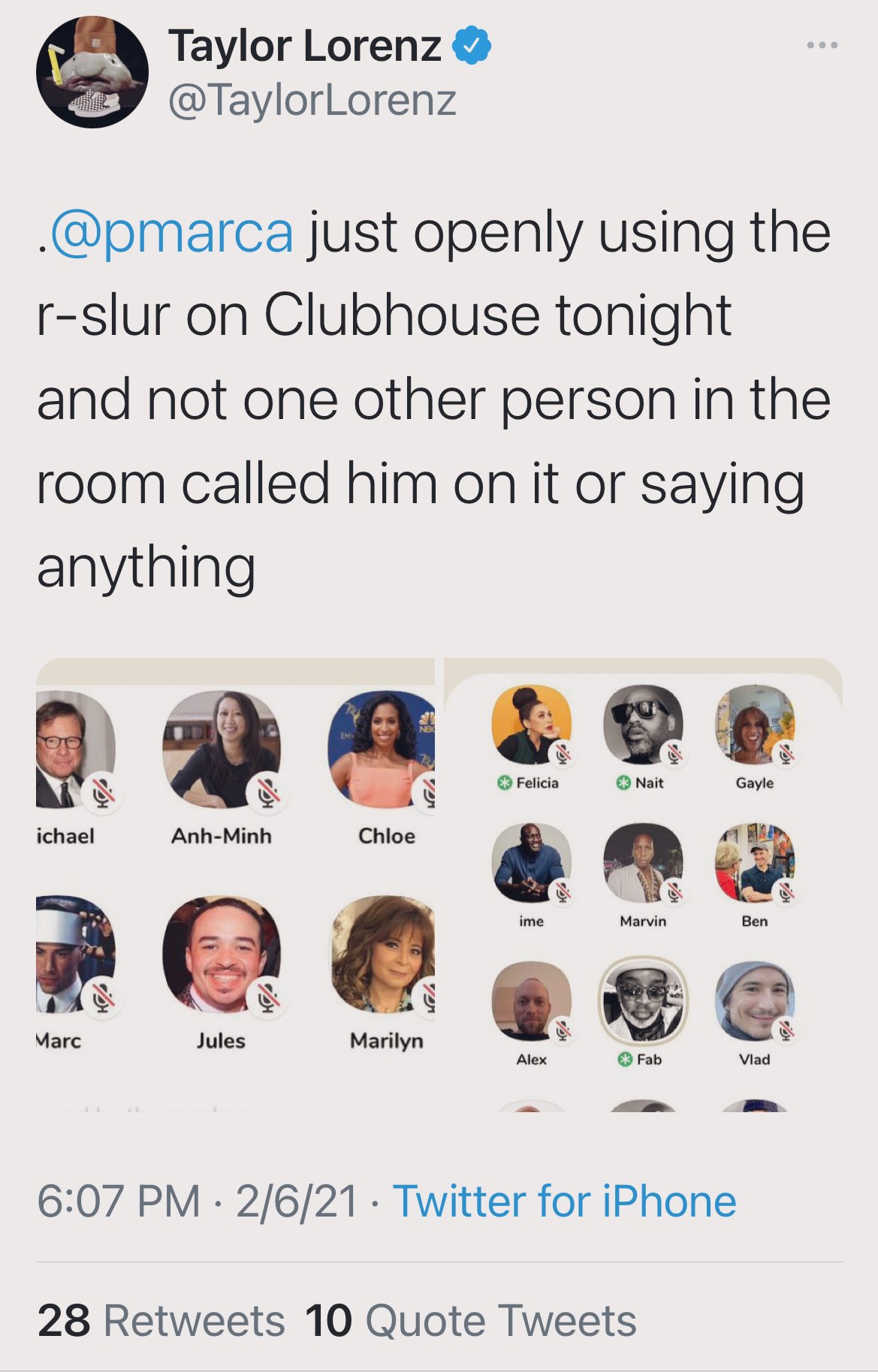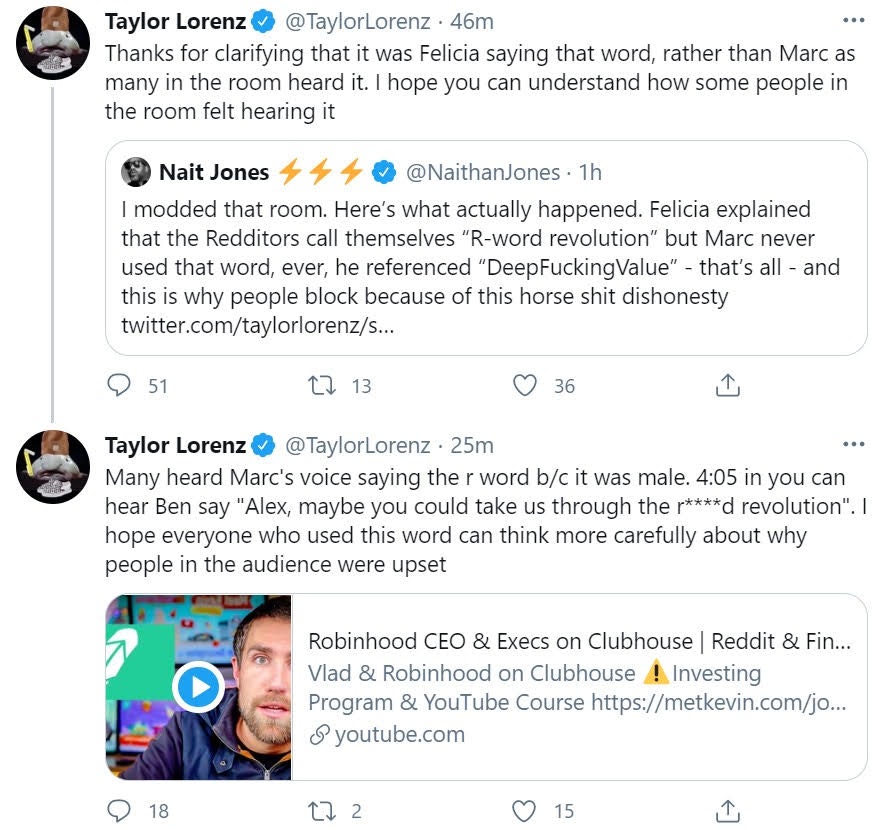ATTENTION NEWS JUNKIES: We are the new Drudge, click here for the News Feed
FOLLOW US ON GAB — CHECK OUT THE MERCH STORE
For a brief moment this week, The New York Times wanted America to forget what it has become.
On Monday, the Times published a story titled “In China, an App Offered Space for Debate. Then the Censors Came.” The story chronicled the fate of latest trendy app for online discussions, Clubhouse.
The article opens by describing the exact sort of free discussion that represents the Internet at its best:
A Chinese man said he did not know whether to believe the widespread reports of concentration camps for Muslims in the far western region of Xinjiang. Then a Uighur woman spoke up, calmly explaining that she was certain of the camps’ existence because her relatives had been among those interned. A man from Taiwan chimed in to urge understanding on all sides, while another from Hong Kong praised the woman for her courage in coming forward.
It was a rare moment of cross-border dialogue with people on the mainland of China, who are usually separated from the rest of the online world by the Great Firewall. [NYT]
But on Monday night, the Chinese government struck, banning Clubhouse and stripping it from the country’s app stores and search engines. The app joined Facebook, Instagram, and Twitter on the long list of foreign social media services banned in China.
A decade ago, China’s repressive behavior would be the only thing of interest in this story. But now is not a decade ago. Now, any follower of the Times can see what the real story is: The hideous hypocrisy of the Regime media, which shills for “free speech” abroad while destroying it at home.
Consider this quote, included in the story, from a Chinese digital activist:
“Clubhouse is exactly what Chinese censors don’t want to see in online communication — a massive, freewheeling conversation in which people are talking openly,” said Xiao Qiang, founder of China Digital Times, a website that tracks Chinese internet controls. “It’s also a reminder that when there is an opportunity, many Chinese have a desperate need to talk to each other and to hear different view points.” [NYT]
Millions of Americans could swap out a few words, and produce a comment on the Times’s own treatment of recently-crushed Twitter rival Parler:
“Parler is exactly what The New York Times doesn’t want to see in online communication — a massive, freewheeling conversation in which people are talking openly. It’s also a reminder that when there is an opportunity, many Americans have a desperate need to talk to each other and to hear different view points.”
While the Times frets over Chinese citizens losing a “freewheeling conversation,” it wrote article after article about how it was dangerous to even let Parler exist. When Google, Apple, and Amazon colluded to banish the site from the web, the Times put out a piece referring to only “so-called” tech censorship. In the same piece, the Times describes Parler as a site for those who “espouse conspiracy theories, make threats and even plan violent rallies,” and those fleeing bans on “hate speech and misinformation.” In short, the Times endorsed the ban, in the guise of reporting. That posture hasn’t changed. As Parler attempted to revive itself, the Times took the now-standard tack of tying it to foreign enemies. “Parler Tries to Survive With Help From Russian Company,” blared a January 19 headline.
But in fact, it’s not even necessary to look at how the Times has treated other free speech platforms in America. To see how naked the press’s hypocrisy is, one only has to look at how the Times has treated Clubhouse, the same app it is so eager to protect overseas.
Taylor Lorenz is a reporter for The New York Times who has spent several months to obsessively policing Clubhouse for alleged thought crime. Last summer, Lorenz pretended to quit the app, protesting that it didn’t do enough to provide Lorenz “safety” from people she disagreed with. In December, Lorenz published an article about the app that was little more than an excuse to agitate for more aggressive moderation on the platform:
Clubhouse will have to do more than pay its creators if it wants to keep them. Many users have complained publicly that the app has failed to roll out sufficient safeguards for users, especially for people from historically marginalized backgrounds.
Rhian Beutler, an entrepreneur and Clubhouse creator who is part of the pilot program, announced on Monday that she was putting her popular Clubhouse trivia show on hold.
“I can’t continue to bring positive things in wake of the continued lack of action by CH in the face of anti semitism, homophobia, transphobia, misogyny, racism ( etc etc),” she tweeted, referring to Clubhouse as “CH.”
Another user, Michaela Hirsh, responded, saying that the company should: “Draw a line for hate speech. Actually ban / suspend people for it. Make it known that it’s unacceptable. Recognize earlier that certain hate groups have organized on the app (and now it’s too late to stop it).” [NYT]
A week ago, Lorenz shrieked that individuals like Roger Stone were being allowed to use the app, and that conservatives were not being banned for spreading “misinformation”:
It's certainly shaping out to be that way. Worrisome considering Clubhouse has zero policy on disinformation and refuses to ban users who promote anti vaxx/COVID-19 misinfo to millions of users https://t.co/ELafsHicRh
— Taylor Lorenz (@TaylorLorenz) February 4, 2021
The same day, Lorenz whined about how users on Clubhouse had the power to block journalists from stalking them across the platform. Not wanting censorious harpies around, Lorenz said, was an effort to evade “accountability”:
Blocking someone on Clubhouse prevents them from seeing/entering rooms you're co hosting. Marc and these other SV men (who again, are some of the app's most followed users now), use blocking to keep journalists out of some of CH's largest rooms to avoid accountability 3/
— Taylor Lorenz (@TaylorLorenz) February 4, 2021
Just two days later, though, Lorenz demonstrated exactly why so many Clubhouse users would want to block reporters. Frustrated that Marc Andreeson was evading her, Lorenz took the more direct route and simply fabricated a lie that he had used the “r-slur” (for those who aren’t fragile New York Times hacks, the “r-slur” is “retard”).

When her lie was quickly exposed, rather than provide “accountability,” Lorenz tried to dodge, “clarifying” that an entirely different person had used the word.

Eventually, Lorenz simply took her account private, deleted her tweets, and posed as a victim for facing criticism.
Most reporting on Lorenz’s meltdown has focused on Lorenz specifically. But her drama says a lot about the overall ideation at the paper she works for. For The New York Times, Clubhouse was good in China because it allowed uncensored discussion, while Clubhouse is bad in the United States because it allows uncensored discussion.
What explains this inconsistency? At heart, it is the replacement of any semblance of principle with total, naked power politics. In China, more free speech would enhance the power of the left and of The New York Times, which is banned there. But in America, where the left enjoys hegemonic cultural power, free speech is a threat. It exposes the increasingly corrupt, incompetent American ruling class to criticism, defiance, and worst of all, ridicule. Just like the Jacobins and Bolsheviks before them, the Times sees the free exchange of ideas as useful only where it does not already hold power.
But in their sheer arrogance and incompetence, the Times thinks that it can sell two narratives at once.
Recently, Revolver issued a warning about America’s failing moral authority. While America has never been perfect, for its first 200 years of life it was almost always one of the world’s freest countries for the average citizen. That gave America enormous pull on people around the world, and gave it tremendous soft power alongside its economic strength.
Now, America’s elites want to keep using concepts like “democracy,” “free speech,” and “openness” as political weapons abroad. They want to have them as justifications for meddling in countries as varied as Iran, Myanmar, Venezuela, and of course China.
But in their cluelessness, the corrupt ruling class of the Globalist American Empire forget why those political weapons once worked. Attacking other countries as undemocratic or repressive worked because America was not those things. America’s hard-earned status as a beacon of constitutional liberties made it the envy of people around the world.
But those old advantages have been thrown away. It is trivially easy for people around the world to see America’s free-speech hypocrisy. The New York Times attacking China for suppressing an app looks outright ridiculous, when the Times itself has tried to stamp out free-speech on the very same app. The Times appears to operate on the mistaken assumption that the rest of the world forgets what it says as quickly as the Times itself does.
It does not. Instead, the world is already learning to throw our ruling class’ hypocrisy back in its face. After Twitter banned President Trump last night, China’s state-affiliated Global Times was quick to gloat at the proof of America’s insincerity:
Just imagine if an influential public opinion figure was banned on social media platforms in other countries, especially those deemed as enemies by the US. The US would vehemently accuse those countries of suppressing freedom of speech!
The hypocrisy and double standards of US democracy have increasingly been laid bare in recent years. Take freedom of speech. For American media outlets and many Americans, those who can speak and whose “freedom of speech” is protected are those who hold similar political viewpoints with them.[Global Times]
The article ends by bragging that, in fact, America has accepted China’s view of free speech:
“Even in the US, a country which claims itself to be the beacon of democracy, freedom of speech has boundaries and bottom lines,” said Xin Qiang, deputy director of the Center for American Studies at Fudan University.
Free speech doesn’t mean irresponsible narratives, including those inciting violence, racism and group discrimination. It does not mean spreading rumors and lies under the banner of freedom of speech, Xin noted.
The next time when the US points an accusing finger at other countries’ efforts to regulate online contents, can it bear this fact in mind? [Global Times]
The Global Times piece is propaganda, of course. It spins China’s repressive speech regime and relentless narrative policing as simply mild oversight to prevent “discrimination” or “spreading rumors and lies.”
But it does get one thing right: America has become the exact same way. The New York Times and other media mouth pieces of the corrupt Globalist American Empire are just as zealous in pushing the propaganda line as any state-run Chinese outlet. And everybody can see it.
ATTENTION NEWS JUNKIES: We are the new Drudge, click here for the News Feed


Join the Discussion